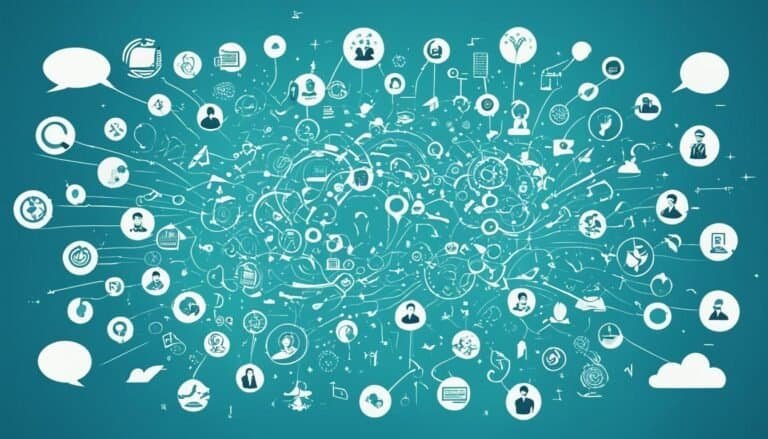Efficient Time Management for Customer Service
Time management is a crucial skill for customer service professionals. It allows them to handle multiple tasks, prioritize urgent requests, and deliver quality service to customers. However, in unpredictable situations, effective time management can become a challenge. In this article, we will share strategies to help customer service professionals improve productivity, efficiency, and overall customer satisfaction.
Key Takeaways:
- Setting SMART goals is essential for effective time management in customer service.
- Planning and prioritizing tasks using tools like calendars and to-do lists saves time.
- Clear communication and collaboration improve efficiency in customer service.
- Automation and streamlining processes reduce errors and free up time for important tasks.
- Continuous learning and feedback help enhance time management skills.
Set SMART Goals
Setting SMART goals is a crucial step in improving time management skills and prioritizing tasks in customer service. SMART goals are Specific, Measurable, Achievable, Relevant, and Time-bound, providing a clear framework for success.
By setting specific goals, customer service professionals can focus their efforts on the most important tasks and avoid being overwhelmed by distractions. Measurable goals allow for tracking progress and evaluating performance, providing a sense of achievement and motivation along the way.
“The greater danger for most of us lies not in setting our aim too high and falling short, but in setting our aim too low and achieving our mark.” – Michelangelo
Customer service professionals can enhance their time management skills by setting achievable goals. These goals should be challenging yet realistic, pushing individuals to stretch their abilities and reach new heights.
Furthermore, goals should be relevant to the individual’s role and the overall objectives of the organization. Aligning goals with the core responsibilities of customer service professionals ensures that their efforts contribute to the success of the team and the business as a whole.
Time-bound goals create a sense of urgency and provide a deadline for completion. This helps individuals stay focused, work efficiently, and maintain a sense of continuity in delivering high-quality service to customers.
Benefits of Setting SMART Goals in Customer Service
Setting SMART goals in customer service brings clarity and direction, enabling professionals to prioritize tasks effectively and improve time management skills. Here are some key benefits:
- Improved Focus: SMART goals help customer service professionals concentrate their efforts on tasks that align with business objectives and deliver the most value to customers.
- Enhanced Motivation: Measurable goals provide a sense of progress and accomplishment, fueling motivation and driving individuals to perform at their best.
- Efficient Resource Allocation: By setting achievable goals, professionals allocate their time and resources more effectively, avoiding wasted efforts on unrealistic targets.
- Clear Performance Tracking: SMART goals allow for monitoring progress and assessing performance, facilitating continuous improvement and identifying areas that need further development.
By implementing SMART goals in customer service, professionals can prioritize tasks more effectively, improve their time management skills, and ultimately provide exceptional service to customers.
| Key Aspects of SMART Goals | Description |
|---|---|
| Specific | Goals should be well-defined and clear, leaving no room for ambiguity or misinterpretation. |
| Measurable | Goals should have measurable criteria to track progress and determine success. |
| Achievable | Goals should be challenging but realistic, taking into account available resources, skills, and constraints. |
| Relevant | Goals should align with the individual’s role, team objectives, and organizational priorities. |
| Time-bound | Goals should have a clearly defined timeframe or deadline for completion, creating a sense of urgency and focus. |
Plan and Prioritize
Efficient customer service requires effective time management techniques. One key strategy is to plan and prioritize tasks. By implementing this approach, customer service professionals can maximize their productivity and provide a seamless experience for customers.
Achieving optimal time management starts with using calendars and to-do lists to organize schedules and allocate time wisely. These tools help individuals stay focused, meet deadlines, and avoid missing important tasks. By visualizing daily, weekly, and monthly goals, customer service professionals can ensure all tasks are accounted for and completed efficiently.
Another valuable technique is the Eisenhower matrix, which categorizes tasks based on their importance and urgency. This matrix is divided into four quadrants: do, decide, delegate, and delete. By classifying tasks into these categories, customer service professionals can identify priorities and eliminate unnecessary interruptions, ultimately saving time and increasing efficiency.
“Planning and prioritizing tasks is key for customer service professionals to effectively manage their time and deliver outstanding service.”
Implementing time-saving techniques and efficient customer service practices not only benefits the professionals themselves but also contributes to enhancing the overall customer experience. By prioritizing tasks, customer service agents can ensure that urgent matters are addressed promptly, while non-urgent tasks are allocated appropriate time slots.
| Benefits of Planning and Prioritizing | How It Enhances Efficiency in Customer Service |
|---|---|
| 1. Enhanced organization | 1. Improved time allocation |
| 2. Reduced stress levels | 2. Increased productivity |
| 3. Improved time management | 3. Prompt response to urgent matters |
| 4. Increased focus on important tasks | 4. Streamlined and efficient workflows |
| 5. Clear prioritization | 5. Elimination of unnecessary interruptions |
Effective Communication and Collaboration in Customer Service
Communication and collaboration are vital elements in providing exceptional customer service. By employing clear and concise communication, selecting appropriate channels, and respecting time preferences, customer service professionals can ensure effective interactions with customers.
One crucial aspect of communication in customer service is the use of concise and straightforward language. Clearly conveying information helps customers understand and address their concerns efficiently. By using simple and jargon-free language, professionals can minimize misunderstandings and resolve issues promptly.
“Effective communication is the cornerstone of excellent customer service. It empowers both customers and professionals to achieve their goals seamlessly.”
Furthermore, selecting the most suitable communication platform is essential for effective customer service. Whether through phone calls, emails, or live chats, professionals need to choose the channels that align with customer preferences and urgency levels. This ensures that customers receive timely assistance while maximizing efficiency.
Collaboration plays a crucial role in streamlining customer service operations. Hiring individuals who are enthusiastic, proactive, and eager to engage in teamwork enhances collective goals. Collaborating effectively within teams assists in sharing knowledge, solving problems efficiently, and providing comprehensive support to customers.
Fostering Trust and Improving Efficiency
Keeping customers in the loop and sharing progress leads to increased trust and improved efficiency. Regular updates on issue resolution, order statuses, and project milestones provide customers with peace of mind and demonstrate a commitment to transparency. This practice also minimizes customer inquiries and reduces the need for repetitive communication, allowing professionals to focus on other crucial tasks.
Collaborative efforts among customer service professionals and other departments contribute to maintaining consistent and accurate information throughout the customer journey. Establishing effective communication channels and processes between teams ensures smooth operations, minimizes delays, and ultimately leads to customer satisfaction.
In conclusion, effective communication and collaboration are integral to delivering exceptional customer service. By employing clear communication channels, selecting appropriate platforms, and fostering collaboration, customer service professionals can enhance efficiency, build trust, and exceed customer expectations.
Automate and Streamline
Efficient customer service relies on effective time management strategies. One such strategy is automation and streamlining, which not only saves time but also improves overall productivity. By leveraging software and systems, customer service professionals can automate repetitive tasks, such as confirmations, reminders, and generating reports.
This automation reduces the risk of errors and expedites processes, allowing customer service agents to focus on tasks that require creativity and empathy. Striking the right balance between automation and the human touch is critical for providing efficient customer service.
Let’s take a closer look at the benefits of automation and streamlining:
1. Reduced Errors
Automation minimizes the chances of human error, ensuring consistent and accurate service delivery. By eliminating manual data entry and other mundane tasks, customer service agents can avoid mistakes caused by fatigue or oversight.
2. Increased Speed
Automating repetitive tasks accelerates response times and improves overall efficiency. With quick access to customer information and predefined responses, agents can address customer inquiries promptly, leading to higher customer satisfaction levels.
3. Time Freedom
By automating routine tasks, customer service professionals gain more time for complex problem-solving, proactive customer engagement, and building meaningful relationships with customers. This allows them to provide exceptional service and surpass customer expectations.
4. Enhanced Personalization
Automation enables agents to personalize customer interactions by providing instant access to customer data and past interactions. This allows them to address individual needs more effectively, creating a personalized and memorable customer experience.
To illustrate the impact of automation and streamlining, let’s take a look at the following table:
| Manual Tasks | Automated Tasks |
|---|---|
| Manually sending confirmations and reminders | Automated confirmation and reminder emails |
| Generating reports manually | Automated report generation |
| Manually inputting customer data | Automated data synchronization from CRM system |
In the customer service landscape, automation and streamlining play a pivotal role in providing efficient customer service. By eliminating repetitive tasks and allowing agents to focus on delivering personalized experiences, businesses can enhance customer satisfaction and loyalty.
Learn and Improve
Continuous learning is key to enhancing time management skills for customer service agents. By actively seeking feedback from customers, colleagues, and managers, agents can gain valuable insights into their strengths, weaknesses, and areas for improvement. Learning from mistakes and staying updated on industry trends are essential components of effective time management in the dynamic field of customer service.
Customer service agents should embrace a growth mindset, recognizing that there is always room for improvement. Actively seeking feedback allows agents to identify areas where they can enhance their time management skills. Whether it’s adjusting response times, refining prioritization techniques, or improving personal organization, feedback provides valuable guidance for improvement.
Additionally, staying abreast of industry trends is crucial for adapting to evolving customer needs and expectations. Agents should continuously update their knowledge and skills through industry blogs, webinars, workshops, and training programs to stay ahead in the fast-paced world of customer service.
Learning opportunities can also arise from interactions with experienced colleagues and mentors. Engaging in knowledge-sharing discussions and seeking advice from seasoned professionals can provide valuable insights and strategies for effective time management.
Furthermore, agents can benefit from exploring time management resources and best practices. There are various time management techniques, such as the Pomodoro Technique, which promotes focused work intervals followed by short breaks to enhance productivity. Experimenting with different methods and adapting them to individual preferences can lead to personalized time management strategies.
Continuous learning not only improves time management skills but also boosts confidence and job satisfaction. Agents who invest in their professional development demonstrate a commitment to delivering exceptional customer service, leading to enhanced customer experiences and greater customer loyalty.
As Mahatma Gandhi once said:
“Live as if you were to die tomorrow. Learn as if you were to live forever.”
By adopting a mindset of continuous learning, customer service agents can continuously refine their time management skills, ultimately leading to improved efficiency, productivity, and overall customer satisfaction.
Analyze Time for Customer Value
Efficient time management in customer service requires a thoughtful analysis of the activities that contribute to customer value and those that do not. By allocating time effectively, professionals can prioritize tasks that directly impact customer satisfaction and reduce non-value activities that hinder productivity.
Identifying Customer Value:
To prioritize customer value, it is crucial to first understand what activities create value for the customer. This includes interactions that directly address their needs, resolve issues, or enhance their overall experience. By analyzing these interactions, customer service professionals can identify areas where time is well-spent and align their efforts accordingly.
Eliminating Non-Value Activities:
Once customer value activities have been identified, it’s essential to eliminate or minimize non-value activities. These are tasks that do not directly contribute to the customer experience or business goals. By reducing time spent on non-value activities, such as excessive administrative tasks or unnecessary meetings, professionals can free up valuable time to focus on delivering exceptional service and exceeding customer expectations.
“Efficient time management in customer service requires a thoughtful analysis of the activities that contribute to customer value and those that do not.”
The key to reducing non-value activities is to identify areas where automation, streamlining, or delegation can be implemented. By leveraging technology or involving other team members, customer service professionals can optimize their time and energy for higher-value activities.
Quick Wins:
An effective strategy for time management in customer service is to focus on quick wins—activities that deliver value to the customer in seconds. These small, impactful interactions not only enhance the customer experience but also boost confidence and motivation. By incorporating quick wins into daily tasks, professionals can improve efficiency, productivity, and overall customer satisfaction.
| Customer Value Activities | Non-Value Activities |
|---|---|
| Responding to customer inquiries | Excessive internal meetings |
| Resolving customer issues | Repetitive administrative tasks |
| Providing personalized recommendations | Unnecessary data entry |
By analyzing time for customer value, prioritizing tasks, and reducing non-value activities, customer service professionals can optimize their time management strategies. This not only improves efficiency and productivity but also leads to a higher level of customer satisfaction and loyalty.
Plan Day for Maximum Value
In the world of customer service, maximizing customer value is essential for success. One effective way to achieve this is by planning your day and understanding the energy flow in customer-facing roles. Each individual has different energy levels throughout the day, and harnessing this energy at its peak can optimize customer interactions and ultimately increase customer value.
To make the most of your day, start by identifying your personal energy patterns. Determine when you feel most energized, focused, and engaged. This may be in the morning, after a midday break, or even in the evening. Once you understand your energy flow, you can plan your day accordingly.
For example, if you are most energized in the morning, schedule your most challenging and high-value tasks during that time. This could include handling complex customer inquiries, resolving escalated issues, or engaging in proactive outreach to build customer relationships. By tackling important tasks when you have the most energy, you can give them the attention and focus they deserve, maximizing customer value in the process.
On the other hand, if you find yourself more alert and productive in the afternoon or evening, reserve that time for activities that require creativity or follow-ups with customers. Use this time to brainstorm innovative solutions, personalize customer interactions, or provide feedback on customer experiences.
Remember, energy flow can vary from person to person, so it’s important to find the schedule that works best for you. By consciously planning your day based on your energy patterns, you can ensure that you are consistently operating at your peak performance, delivering exceptional customer service, and maximizing customer value.
Key Takeaways:
- Understanding your personal energy patterns is essential for optimal customer interactions.
- Identify the times of day when you feel most energized and engaged.
- Schedule high-value tasks during your peak energy periods.
- Use less energy-intensive periods for creative tasks or follow-ups with customers.
- By aligning your energy flow with your daily schedule, you can maximize customer value and provide exceptional customer service.
Conclusion
Effective time management is the key to delivering an exceptional customer experience. By implementing strategies such as analyzing time, prioritizing tasks, automating processes, and continuous learning, customer service professionals can enhance their efficiency, productivity, and overall customer satisfaction. Time management allows them to allocate resources effectively, reduce response times, and ensure timely resolution of customer issues.
By prioritizing customer value and eliminating non-value activities, customer service professionals can focus on delivering the most impactful interactions. Automating repetitive tasks through software and systems frees up valuable time for more complex and empathetic customer interactions. This balance between automation and the human touch is crucial in providing efficient and personalized customer service.
Ultimately, effective time management leads to improved customer loyalty and a competitive advantage. When customers receive timely and effective solutions to their problems, they are more likely to feel valued and develop a strong connection with the brand. This positive customer experience fosters loyalty, encourages repeat business, and enhances the overall reputation of the organization.







